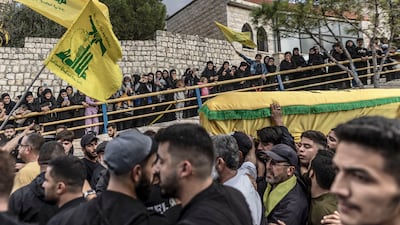Live updates: Follow the latest news on Israel-Gaza
Six Hezbollah fighters and a Palestinian militant were killed in fighting along the Lebanon-Israel border on Saturday in some of the most intense clashes to take place since the frontier conflict began 14 days ago. An Israeli soldier was also killed in the previous night's skirmishes, the Israeli army said on Saturday.
The escalating tit-for-tat exchanges appeared to enter a more violent phase on Saturday night as Israeli air strikes pounded several points along Lebanon's southern border.
The sound was heard in the city of Tyre, almost 40 kilometres away.
“Tonight is the first time they conduct air raids using planes” instead of drones, Hezbollah spokesman Mohammad Afif told The National.
The skirmishes began after the Israeli military launched a war on the Palestinian militant group Hamas in the Gaza Strip, in Israel's south, earlier this month.
Since the war in Gaza began, Hezbollah – a powerful Lebanese party and paramilitary – has fired at Israeli positions from Lebanon into northern Israel or provided cover for Palestinian militants to do so, in an attempt to deter its southern neighbor from conducting a ground offensive on the blockaded Palestinian enclave.
Iran-backed Hezbollah is a long-time ally of Hamas, which controls Gaza.
But the cross-border attacks threaten to open a second front, raising fears that the Hamas-Israel war could turn into a regional one.
It is the worst violence Lebanon has seen in years, since the 2006 July war between Hezbollah and Israel, which lasted 34 days.
Hezbollah said 19 of its fighters have been killed so far, with Saturday's deaths taking the total number of casualties in Lebanon to at least 28, including civilians and Palestinian militants. In Israel, the death toll is estimated to be about eight.
'Nothing in comparison to what’s happening in Gaza'
The hostilities have forced residents close to either side of the border to flee their homes.
A two-storey house on a hill in the southern Lebanese village of Rab Al Thalathine was reduced to a pile of concrete in Saturday’s air strikes.
“It’s our family house,” said Mohammad Barakat, a jovial car mechanic who lives in Beirut. His family used it as a holiday home for summers and weekends, Mr Barakat told The National but had stayed away since border clashes began.
“We recently built an extension to the house,” Mr Barakat said. “And we were going to furnish it …”
He burst into laughter and gestured at the rubble. “Well, there’s no need to furnish it now!”
When asked how he felt about the prospect of war erupting in Lebanon, he frowned and shrugged.
“What’s happening here is nothing in comparison to what’s happening in Gaza.”
On the route out of Rab Al Thalathine is a scenic mountain pass where grazing goats amble down the road, past a series of shuttered restaurants.
“All the power to them [the Palestinians],” said Mahmoud, the owner of one restaurant. The sound of Hezbollah rockets and Israeli bombardment could be heard just beyond the mountain.
“But don’t we get a say in whether or not we want war?”
Like much of politically fragmented Lebanon, the country’s south is also split between supporters of Hezbollah who, like Mr Barakat, support Palestinian efforts to achieve self-determination, and others, like Mahmoud, who prefer their struggling country to steer away from the conflict.
The spectre of the 1975-1990 civil war, in which Lebanon splintered along political and religious lines, looms large as does the 2006 July War between Hezbollah and Israel that led to the destruction of much of Lebanon’s infrastructure. And Israel’s occupation of the south until 2000 has left a bitter taste in the mouths of most residents.
In coastal city Tyre, about 20km north of the border, the weekend nightlife continued despite the distant sound of air strikes. Families strolled along the corniche, young men blasted music from car stereos, and restaurants were buzzing.
“It’s not as busy as usual because of the situation being the way it is,” a passer-by on the corniche said. “But honestly, for the most part, we’re used to this.”
More than 4,200 people have been displaced from southern Lebanese villages by border clashes, with about 1,500 staying in three schools in Tyre.
Local officials have said they are ill-prepared for the much larger outflow that would ensue if the border conflict escalated into all-out war.


